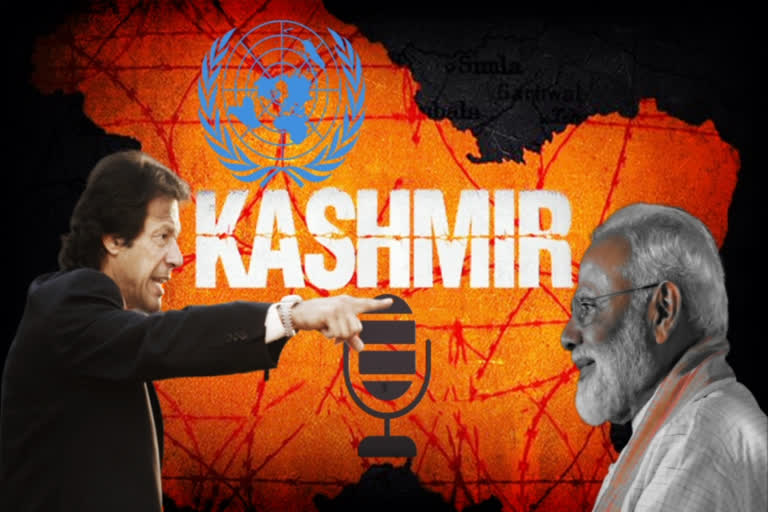Hyderabad: Kashmir is expected to take centre stage as India and Pakistan are all set for a face-off at the United Nations, with both the Prime Ministers, Narendra Modi and Imran Khan to address the UN General Assembly on September 27.
Here is how the Kashmir issue played out at the United Nations over the years:
Between 1948 and 1971, the United Nations Security Council passed 23 resolutions, which were aimed at mediation and providing a solution to the Kashmir conflict.
It all began on January 1, 1948, when India lodged a complaint under Chapter VI of the UN Charter, accusing Pakistan of aiding the tribal invasion in Jammu and Kashmir. India claimed that the entire erstwhile princely state of Jammu and Kashmir legally belonged to her by virtue of the treaty of accession signed by its ruler Maharaja Hari Singh. Pakistan however, denied aiding the raiders, and in turn accused India of annexing Kashmir.
On January 17, 1948, UNSC passed Resolution 38, its first on Kashmir, calling on India and Pakistan to exercise restraint. The neighbours agreed to the appointment of a UN Commission to mediate between them.
On January 20, UNSC passed Resolution 39, creating the three-member UN Commission for India and Pakistan, which was to 'investigate' the dispute and mediate.
Led by Britain and the US, UNSC passed Resolution 47 on April 21, 1948, which expanded the membership of the UNCIP from 3 to 5, and called for cessation of hostilities between India and Pakistan, withdrawal of all Pakistani troops and tribesmen and bulk of Indian troops, allowing return of refugees, release of political prisoners and holding of a UN-supervised Plebiscite in Jammu and Kashmir. India was allowed to deploy a minimal number of troops to maintain law and order.
The two countries accepted the cease-fire plan and allowed the UN to observe the ceasefire from January 1, 1949. On January 5, 1949, to address Pakistan's fears that India may try to influence the plebiscite, the UN proposed that Jammu and Kashmir should be under the full control of the Plebiscite Administrator.
In December 1949, UNSC President General AGL McNaughton unsuccessfully tried to mediate between Indian and Pakistan, calling for demilitarization. The UNCIP was then replaced by a single UN representative Owen Dixon in 1950, who soon concluded that there was little or no hope regarding an Indo-Pak agreement on demilitarization. Dixon proposed holding plebiscites either region by region or only in the 'doubtful' region, the Kashmir valley. But India and Pakistan could not come to an agreement on the Dixon proposals. Dixon was then succeeded by Frank Graham, followed by Gunnar Jarring, who were both unsuccessful in making any headway.
As the mandate of UNCIP terminated, UNSC passed Resolution 91 on 30 March 1951, which established the United Nations Military Observer Group in India and Pakistan to monitor the ceasefire line, now called the Line of Control. UNSC then passed another resolution which reiterated earlier resolutions that called for a final settlement of the dispute through a plebiscite.
Although Pakistan kept raising the Kashmir issue in the 60s, UN involvement considerably reduced after the Indo-Pak war of 1965. After intense pressure applied by the US and the Soviet Union, India and Pakistan agreed to observe a UN-sponsored ceasefire on September 29, 1965. The UN was virtually elbowed out of the Kashmir dispute by Russia after the war when it negotiated the Tashkent Peace Agreement between the two neighbours.
The last of Kashmir-related resolutions demanded ceasefire and came in the backdrop of the 1971 Bangladesh war, which eventually led to the Simla agreement. Ever since India has maintained that the Simla Agreement overrides all prior UN resolutions on Kashmir as it meant that the dispute would be settled bilaterally. Pakistan however, felt the agreement did not rule out UN involvement.
Read: India planning to snub Pakistan 'false blip' on kashmir at the UN


